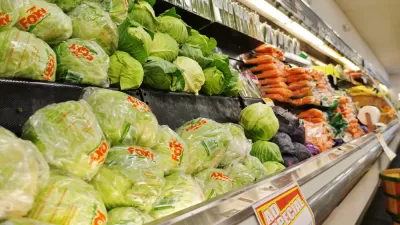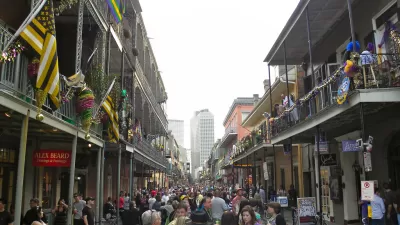According to one recent study, regional culture plays a major part in how healthily people eat. Supply may be less of a factor than demand.

Urbanist debates around healthy eating often focus on food deserts: places where healthy options aren't readily available. But according to this study, regional tastes and cultural preference may play a larger role.
As Caitlin Dewey puts it, "For years, advocates have argued that it's largely a problem of access: Consumers eat junk because they can't afford healthful foods or can't find them in their communities. Now, an emerging body of research suggests that some groups of consumers may simply be less interested than others in buying healthful groceries."
Lead author Hunt Allcott "hypothesizes that a region's dominant cuisine, be that barbecue or avocado toast, informs the meals that people eat as children. That, in turn, has a large effect on their lifelong food preferences."
The study calls out Montana's Musselshell County for its particularly unhealthful food purchases. Apparently, readers from Musselshell fired back, noting that "residents often supplement their diets with items from hunting trips and home gardens, meaning that they may be eating more healthfully than measurable data indicates."
FULL STORY: This is the U.S. county that buys the least healthful groceries

Planetizen Federal Action Tracker
A weekly monitor of how Trump’s orders and actions are impacting planners and planning in America.

Restaurant Patios Were a Pandemic Win — Why Were They so Hard to Keep?
Social distancing requirements and changes in travel patterns prompted cities to pilot new uses for street and sidewalk space. Then it got complicated.

Map: Where Senate Republicans Want to Sell Your Public Lands
For public land advocates, the Senate Republicans’ proposal to sell millions of acres of public land in the West is “the biggest fight of their careers.”

Maui's Vacation Rental Debate Turns Ugly
Verbal attacks, misinformation campaigns and fistfights plague a high-stakes debate to convert thousands of vacation rentals into long-term housing.

San Francisco Suspends Traffic Calming Amidst Record Deaths
Citing “a challenging fiscal landscape,” the city will cease the program on the heels of 42 traffic deaths, including 24 pedestrians.

California Homeless Arrests, Citations Spike After Ruling
An investigation reveals that anti-homeless actions increased up to 500% after Grants Pass v. Johnson — even in cities claiming no policy change.
Urban Design for Planners 1: Software Tools
This six-course series explores essential urban design concepts using open source software and equips planners with the tools they need to participate fully in the urban design process.
Planning for Universal Design
Learn the tools for implementing Universal Design in planning regulations.
Heyer Gruel & Associates PA
JM Goldson LLC
Custer County Colorado
City of Camden Redevelopment Agency
City of Astoria
Transportation Research & Education Center (TREC) at Portland State University
Camden Redevelopment Agency
City of Claremont
Municipality of Princeton (NJ)



























